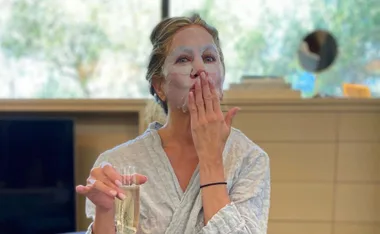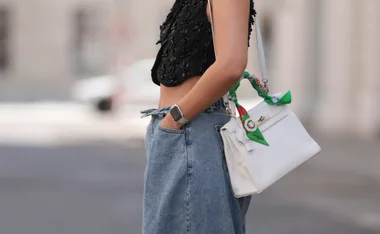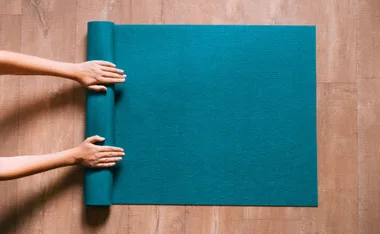Exclusive extract from One Sunday (Macmillan), written by Joy Dettman.
Tom heard that hammering and he didn’t want to wake up and hear it took it into his dream. It was the young Ronnie, in uniform. In his dream, he reached for his oldest boy, then he saw he had no face, no arms, and in his sleep Tom cried out his son’s name.
That woke him, head pounding, heart racing. That bloody dream. God only knew how many times he’d dreamed it. It was always Ronnie at that door, never young Johnny; perhaps Tom’s subconscious had accepted his youngest boy’s death. All of those dreams started out the same, always the same knocking at the door, and him running, knowing that it was his boy coming home.
He rose from his pillow, shaking his head, trying to get rid of that dream. The knocking continued. Some bugger wanting him, and he’d only just got to sleep. He stood, grabbed his trousers, stepping into them in the dark passage. He found his way to the knocking coming from the police station office door. He turned the key and peered out into the gloom, hoping he was awake and not dreaming he was awake, praying Ronnie wouldn’t be standing there.
For an instant he could have sworn it was him. There was a reflex reaching out of his hand, then he recognised his milkman, young Kurt Reichenberg. And what the hell did he think he was doing, waking people up at this time of the day?
‘It’s Rachael Squire,’ Kurt said. ‘She’s hurt. She’s on the road in front of our place.’ Tom’s heart lurching as two fast beats tripped over each other, he stepped out onto the veranda. ‘Dave Kennedy’s bride? Where?’
‘Near our gate. I’ve told the doctor.’ And he was gone, riding off down hill.
Old Joe Reichenberg’s property shared a fence with Dolan’s hotel, over a mile east. Tom yawned, closed the door and felt his way back to the kitchen, where he opened the stove’s firebox and poked a few sheets of newspaper in, needing its light, not its heat.
Not often did he curse Molliston’s lack of electricity, but he cursed that web of wires now. All across Victoria they were weaving their night-time magic, but they still hadn’t sidetracked those wires to Molliston. Much had been promised these last years and much had been delivered, but not electricity.
A time of great progress, the twenties, a time of consigning that bloody war to the past and getting on with it. A lot of the land had been opened up in the Solider Settlement Scheme — many of those returned boys had no trade to return to, so the government offered them blocks of land and equipment to develop that land. Some made a success of it.
William was the service centre for a large area. They had a butter factory, a cannery, an abattoir and a small clothing factory; they had doctors, dentists, a well-equipped hospital. William was growing in population daily while Molliston stagnated, though the Johnsons, Murphy’s and O’Briens, all good Catholics, were doing their best for the town. Molliston could consider itself lucky to have the telephone, thanks to Nicholas Squire, the town toff, who knew folk in high places and who had stamped his handmade boots hard enough in those high places to get those wires through town.
Tom dressed in the kitchen, in the clothing he’d shed too few hours ago. He pulled on a collarless shirt, slipped his arms into his vest — not for warmth but for the watch he kept in its pocket. He hated not knowing the time.
He poked a few sticks into the stove before pulling on his socks. Forcing two large lumps of wood in, he felt the weight of his kettle. It was full enough, he closed the flue up tight, hoping there were enough embers in there to catch onto that wood; he pulled on his boots, and headed for his front door, lifting his lightweight helmet from the peg in the vestibule as he walked.
Milk billy on his doorstep, pennies on his lid — he stepped over it; one foot on the cane chair, he was tying his bootlaces when he saw Rob Hunter ride out to the road.
‘Hang on, Rob,’ he called. He checked the tyre pressure in his bike, which was propped for the night against his wall, then walked it across to where Rob waited. ‘What’s happened to her? Do you know any more than me?’
“Young Reichenberg said he was on his way to work and he found her on the side of the road. Said he couldn’t wake her — that her head was bleeding.”
“Sounds like a road accident. I heard the widow Dolan racing around last night. She’s probably hit her.”
“Did you forget your bike clips, Robbie?’ a voice called from the hospital veranda.
‘I’m wearing them.”
Tom had a bad habit of misplacing bike clips and mincing his trouser cuffs in the chain when no one reminded him. He tucked those cuffs into his socks, mounted his bike and the men pushed off downhill.
Only a bike rider or a winded nag would call that slow an incline a hill. It was a slope, through the length of that slope made it a long hard push back into town. There wasn’t a lot to see from Merton Road once the shops and school were left behind. Hay’s property on the left, Larkin’s on the right, and not much of a road in between. Carved by the thousands in their quest for gold, reclaimed by nature, Merton Road was now a dusty goat track leading to a crumbling ghost town.
A road gang had been through six months back. They’d dropped a bit of gravel down this way and put in a culvert, then they’d called it good enough. It was far from good enough. Old ruts forged by the iron wheels of yesteryear were deep, and recent wind storms hadn’t helped any. Most of the gravel dumped on that road had now moved off to the sides.
They crossed over the hump of that culvert and, a hundred yards on, sighted Kurt Reichenberg standing guard over a prone figure, Tom dismounted and leaned his bike against a clump of stunted wattle.
Rob, 15 years his senior and not so agile, placed one foot down and took his time. He retrieved his bag from the wire basket, his lantern from the handlebars, then allowed his bike to fall. The lantern held low, they stood looking down at the girl: blood staining the side of her mouth, blood around her nose, no obvious sign of laceration.
“Shite,” Rob said. “Hang on to the light for me, Tom.” And he was down on one knee, his fingers searching for a pulse. “Hold it over her. Tilt it, and get rid of that shadow. Now hold it there”. He lifted her head, his fingers doing more examining than his eyes, then he placed her head gently down. “Shite,” he said. “Shite, shite and more of it. What’s gone wrong with this bloody town tonight?”
‘” can carry her up to the hospital, Doctor Hunter. She’s no weight.”
‘The ambulance is on its way. I reckon she looks comfortable enough where she is, lad.’
More light creeping out of the east now, Tom could see blood on Kurt’s shirt, blood on his hand, which he was rubbing against the leg of his trousers.
“You’ve got a lot of her blood on you, Kurt,” Tom said.
“I tried to lift her, before I saw she was injured.”
“You didn’t see what happened to her?”
Kurt shook his head, turned away.
“She’s taken some sort of blow to the base of the skull, by the looks of it. That’s all I can find,” Rob said.
“Hit by a car?”
“Not likely. Something would have broken. There’d be skin off somewhere. There’s hardly a mark on her.” Rob continued his examination, lifting her sleeves, looking at her arms, her legs. “Can’t see anything in this light. You didn’t straighten her up at all, lad? Didn’t pull her skirt down?”
“She’s … as I found her.”
“She’s been carried here, and not long ago.” Rob gained his feet with difficulty and turned down to the sound of the horse’s hooves and creaking harness. “Someone’s down there.”


.png?resize=380%2C285)
































.jpg?resize=380%2C285)

















